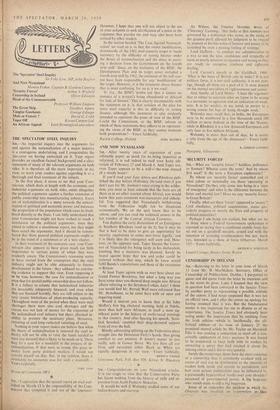The 'Spectator' Steel Inquiry
Sir Toby Low, MP, John Hughes
And Now Nyasaland
Monica Fisher, Captain R. Gordon Canning `Security Forces' , Arthur S. Wigfield
Censorship in Ireland Oliver Edwards Head of the Commonwealth
Prof essor William Empson The Great Ship Geoflrey Agnew Yangtse Gunboats George Edinger Male or Female 7 David G. Cobb Taper Off Kos set Carpets Ltd.
An African Appeal Lord Hemingford and others THE 'SPECTATOR' STEEL INQUIRY
SIR.—An impartial inquiry into the arguments for and against the nationalisation of a major industry is a courageous undertaking, and I congratulate the Spectator on having embarked on it. Your report provides an excellent .factual background and a clear statement of many of the relevant arguments on both sides. It is •therefore all the more important, in my view, to warn your readers against regarding it as a thorough and final treatment of the subject.
In the first place, it seems to me that your Com- mission, which deals at length with the economic and industrial arguments on both sides, omits altogether the political arguments against a further extension of public ownership into manufacturing industry. Every act of nationalisation is a move towards the concen- tration of political and economic power and increases the proportion of the population which owes its liveli- hood directly to the State. I can fully understand that your .Commission might not have wished to reach a conclusion on the political arguments, since they aimed to achieve a unanimous report, but they might have stated the arguments. And it should be remem- bered that those general political arguments ought to be in the mind of a statesman Or of a wise elector.
In their treatment of the economic case,- your Com- mission also appears to have given much too little importance to various points of which they were evidently aware. The Commission's reasoning seems to have started from the assumption that the steel industry might not be able adequately to finance development in the future: they adduced no convinc- ing evidence to support this view. Even supposing it to be true, however, the case for nationalisation or even that for partial public ownership does not follow. It is a fallacy to assume that nationalised industries are invariably adequately financed; and even when they are financed lavishly, they are Still subject to the very severe limitations of plant-producing capacity. Throughout most of the period when there Were steel shortages there were also coal shortages and the reason was not lack of money for the expansion of the nationalised coal industry but sheer, physical in- ability to procure the necessary plant. Moreover, rationing of coal long outlasted rationing of steel. Nothing in your report makes me believe that when the threat of nationalisation is removed the steel in- dustry will not be able to raise the funds needed • to meet any demand that is likely to be made on it. There may be a case for a standstill in the process of de- nationalisation, if that were to rescue this great in- dustry from party political warfare. 1 would not commit myself on that. But, in my opinion, there is absolutely,no economic case for such is standstill.-- Yours faithfully. .•
House of (l'ommons„SW I
• I Oily w v


































 Previous page
Previous page